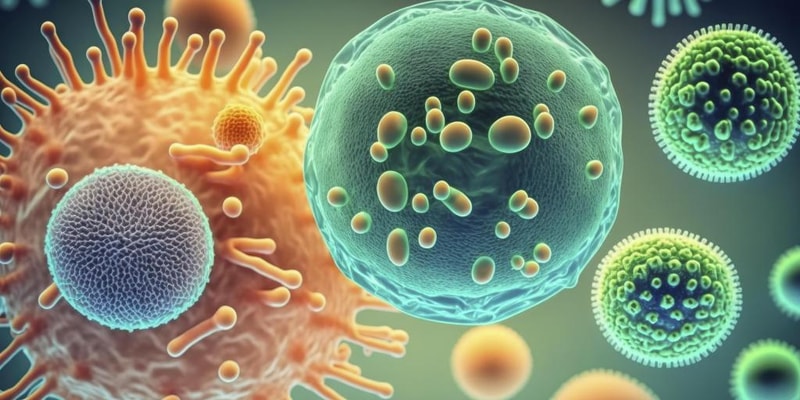37 Questions
What is the purpose of RhD antigen (Rhogam) given to Rh-negative mothers before delivery?
To prevent the development of Rh+ antibodies
How is monoclonal antibody therapy different from Immunoglobulin therapy?
Monoclonal antibody therapy only has one epitope specific for one type of antigen.
What is the main purpose of adjuvants in vaccines?
To improve immune reactions to vaccine antigens
What term is used to describe the protection offered to vulnerable individuals by immunizing a significant portion of a community?
Herd immunity
What is the main aim of the Child Immunisation Schedule?
To protect children and adults against major diseases
What does passive immunity involve?
Administering exogenous antibodies to provide immediate protection
What is the ideal outcome of achieving herd immunity in a community?
Protection for those who cannot be immunized
What is one potential consequence of failing to achieve herd immunity in a population?
Higher risk of disease outbreaks
Which type of immunity involves administration of antibodies that provide immediate protection?
Passive immunity
In terms of antibody specificity, how does monoclonal antibody therapy differ from Immunoglobulin therapy?
Immunoglobulin therapy covers a wide range of epitopes.
What is the purpose of administering RhD antigen (Rhogam) to Rh-negative mothers before delivery?
To prevent the development of Rh+ antibodies in the mother's body.
What distinguishes monoclonal antibody therapy from Immunoglobulin therapy in terms of antibody specificity?
Monoclonal antibody therapy targets one specific epitope.
What is the primary objective of adjuvants in vaccines?
To enhance immune reactions to vaccine antigens.
Which term describes the phenomenon where a significant portion of the population is immunized to protect vulnerable individuals who cannot be vaccinated?
Herd immunity
What type of immunity involves the administration of exogenous antibodies to provide immediate protection?
Passive immunity
How does passive immunity differ from active immunity?
Passive immunity provides immediate protection, while active immunity takes time to develop.
What is the potential consequence of failing to achieve herd immunity in a population?
Increase in vaccine-preventable diseases.
What distinguishes monoclonal antibody therapy from passive immunity?
Passive immunity involves the in vitro generation of specific antibodies.
What is the primary role of adjuvants in vaccines?
Enhance the immune response to vaccine antigens
If a community fails to achieve herd immunity, what is a potential severe outcome?
A possible rise in severe anaphylactic reactions
Which scenario best describes the purpose of the Child Immunisation Schedule?
To ensure vaccination coverage for children and into adulthood
What potential complication may arise if Rh-negative mothers do not receive RhD antigen (Rhogam) before delivery?
Risk of developing Rh+ antibodies affecting future pregnancies
What is a significant feature of monoclonal antibody preparation compared to Immunoglobulin therapy?
Has only one epitope specific for one type of antigen
How does herd immunity benefit individuals who cannot be immunized?
By reducing their risk of exposure to diseases
Which statement accurately describes the process of producing monoclonal antibodies?
Produced through the fusion of a plasma cell with an immortal cell
What is the main goal of administering RhD antigen (Rhogam) to Rh-negative mothers before delivery?
To prevent the development of Rh+ antibodies affecting future pregnancies
What role do adjuvants play in vaccines?
Improve immune reactions to vaccine antigens
What is the significance of adjuvants in improving immune reactions to vaccine antigens?
Adjuvants help improve immune reactions to vaccine antigens by enhancing the immune response.
Explain the concept of herd immunity and its importance in disease control within a community.
Herd immunity refers to the protection of individuals who cannot be immunized by having a significant portion of the population vaccinated. It is crucial for controlling diseases within a community.
How does passive immunity differ from active immunity in terms of antibody administration?
Passive immunity involves the administration of exogenous antibodies to provide immediate protection, while active immunity results from the body's immune response to antigens.
What is the main goal of the Child Immunisation Schedule and why is it government-funded?
The main goal of the Child Immunisation Schedule is to protect children and adults against major diseases. It is government-funded to ensure widespread access and coverage.
What are some potential severe side effects of vaccination, and why is it important to be aware of them?
Severe side effects of vaccination can include anaphylaxis. It is important to be aware of these risks to ensure timely intervention and management.
How is monoclonal antibody therapy different from Immunoglobulin therapy in terms of antibody specificity?
Monoclonal antibody therapy involves the production of single-epitope antibodies specific to one antigen, while Immunoglobulin therapy contains antibodies against multiple epitopes.
What is the purpose of RhD antigen (Rhogam) administration to Rh-negative mothers before delivery?
RhD antigen (Rhogam) is given to prevent the development of Rh+ antibodies in Rh-negative mothers, which could impact future pregnancies.
Describe the production process of monoclonal antibodies and the key feature of their preparation.
Monoclonal antibodies are produced through hybridoma technology by fusing a plasma cell with an immortal cell. They have single-epitope specificity for one type of antigen.
What is the concept of passive immunity, and how does it provide immediate protection?
Passive immunity involves the administration of exogenous antibodies that offer immediate protection by providing ready-made antibodies to combat pathogens.
How do adjuvants contribute to the effectiveness of vaccines, and why are they essential components of vaccination?
Adjuvants enhance the immune response to vaccine antigens, improving vaccine effectiveness. They are crucial components of vaccination to ensure a robust and long-lasting immune response.
Make Your Own Quizzes and Flashcards
Convert your notes into interactive study material.
Get started for free

